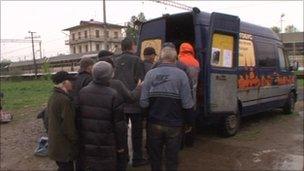Russia's growing wealth gap
- Published
Jamie Robertson reports
Late night Friday and the Ts lounge bar is well into its relaunch. This is downtown St Petersburg off the main drag of Nevski Prospekt.
The crowd are a mix of the city's glitterati pulled in, willingly one imagines, to give it the stamp of exclusivity - artists, fashion designers, businesswomen, and the ebullient popstar Tatyana Bulanova.
There's a fashion show thrown in too. This has to be Russia - the 6ft models sashaying between the guests are decked out in furs.
In London or New York you wear fur at the risk of being vilified by animal rights campaigners.
Here, with a beaver, sable or mink over your shoulder, you've got style, respect and wealth.
But the wealthy in Russia represent just a thin layer at the top of a society that still shows some remarkable similarities to the one that was cast off 20 years ago with the collapse of communism.
Overall wealth has certainly grown over the last two decades. But within that growth there are harsh differences.
The bottom 40%, who live in the sprawling Soviet-era suburbs, are being paid less in real terms than they were in 1991, while only the top 20% have seen their incomes more than double.
Deviant behaviour
And there is growing concern that this is creating social tension, according to the economist Alexander Butukhanov.
"When people come across some social restrictions, and when people see no way out from their social and economic situation, it's not surprising to see the signs of destructive and deviant behaviour in a society up to the point of criminality," he says.

In stark comparison, the poor queue for food from the night bus
Those at the bottom of the pile can be found sleeping rough amongst the Soviet blocks and the new motorways.
The night bus hands out food to the people that the new capitalism has left behind. They queue quietly behind the blue rusting minivan waiting patiently for the doors to open.
Vodka is, relative to average income, some five times cheaper than it was in 1991.
Most appear drunk, but there's no aggression.
One grey-haired lady walks, one hand grasping on to her partner, the other on a stick, still holding her head up as though trying, in her ragged clothes, to maintain some long-lost dignity.
No-one really knows how many there are like her in St Petersburg - or in Russia.
Widening gap
Zoya Solovyova is president of The Night Shelter, which runs the bus.
She says the problem is not even being quantified: "The government should count the people like this, work out what the problem is and try to find out what kind of services they need.
"And secondly they should plan special programmes and build shelters, nothing special or unusual, just do traditional things like they do in the UK and the States."

The St Petersburg Yacht Club 1887 caters for different levels of customers
The number of those who visit the night bus is not huge and, to be frank, you could find people like them in virtually any big city in the world.
But the real problem is in the growing gap. The poor are scraping by. The wealthy are thriving, emerging from the financial crisis unscathed.
For instance, at the St Petersburg Yacht Club 1887, which despite its name is just four years old, co-owner Denis Denisov is building 100 new berths for yachts and motor boats.
But when it comes to sailing he is, in his words, "totally democratic". He has a passion for the sport and wants everyone to take part.
"We have very different levels of customers," he says. "We construct some parts of the marina exclusively for top level customers. It's mainly big motorboats, for rich people.
"In other parts we construct more democratic berths for sailing boats for all levels of people, and in some cases with very low prices."
Progressive taxation
But the truth of the matter is that at maximum this yacht club, built on the site of the long vanished Imperial yacht club, is unlikely to have more than 350 berths in total.
And it is the only yacht club in Russia's largest seaboard city. In contrast, in neighbouring Estonia there are over 50 marinas
Although workers are building a helipad, Mr Denisov's market is not just the rich but the aspirational sailor, paying $1,500 (£910; 1,050 euros) for one of the dinghies that bobs down the Neva river, and dreaming of one day owning a super-yacht.
And it is that aspiration that keeps the government from taxing the rich too heavily.
Again and again it has promised to tax rich and poor alike at the same level - 13% for everyone. But the gap between the wealthy and the poor is growing too big to be ignored.
Alexander Butukhanov believes the question of progressive taxation will become an increasingly divisive issue.
"On the subject of taxing the wealthy, I'm sure that politicians will return to the question of a progressive tax scale. The government will have to revisit it," he says.
"And with an approaching election, future candidates for president will have to answer the questions about taxing the rich more heavily."
The overtly rich of course are still confined largely to the biggest cities, Moscow and St Petersburg.
Their numbers are small but growing. Perhaps that is why any resentment among the swathe of the population still living as they did in 1991 has not found a political voice.
But the distance between the two grows, storing up political problems for the years ahead.